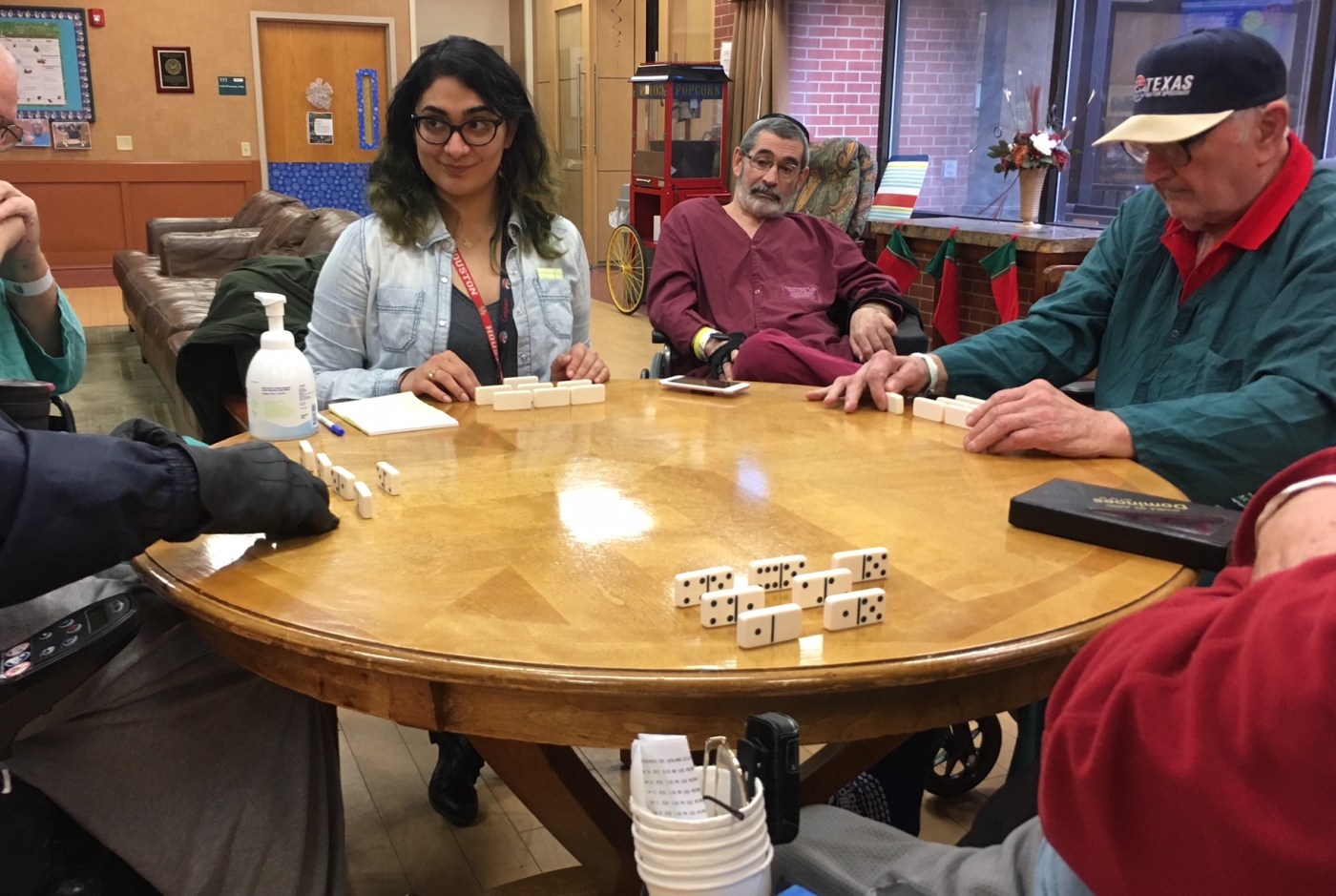Recreational therapist Lauren Reynaga had never played dominoes before her internship and subsequent employment with VA North Texas.
A dedicated group of patients–aspiring dominoes aficionados if you will–residing in Dallas’ Community Living Center (CLC), brought Reynaga into their world via the board game and the daily matches. For Reynaga and her fellow recreation therapists, the game is one of many activities designed to restore, remediate and rehabilitate a person’s level of functioning, independence and overall wellness.
VA recreational therapists are vital members of an interdisciplinary health care team using a wide range of activity and techniques to improve the physical, cognitive, emotional, social, and leisure needs of Veterans battling psychological and physical illnesses and other disabling conditions.
Simply put, recreational therapy reduces or removes limitations and restrictions that prevent patients from enjoying recreation and leisure as the road to whole health care. Common recreational activities expand greatly beyond board games into adaptive bicycling, golf, music, aromatherapy, amputee soccer and sightseeing tours tailored to an individual Veteran and their needs.
“It’s important that I make a connection with the Veteran to best deliver care they need,” said Leslie Revilla, VA North Texas recreation therapist. “Recreation is something that everyone needs in a balanced life, not just one focused on work or sedentary activities.”

VA North Texas Recreation Therapists, Leslie Revilla and Lauren Reynaga, help Marine Corps Veteran, Roy Shelton, use a recumbent bicycle for the first time as part of his tailored active therapy program.
One of the Veterans finding a new lease on life thanks to recreation therapy spent several years actively traveling the globe in service to his country. Marine Corps Veteran Roy Shelton lost part of his leg to an infection, a true life-altering experience for a Veteran used to an active lifestyle in and out of military service. Shelton got back on a bicycle for the first time in months thanks to the prompting of Reynaga, Revilla and a wide-open gymnasium.
“I was kind of nervous to tell the truth about getting on a bike with one leg,” said Shelton. “But once I was on, I was motivated to get going and ride the course.”
Returning to an activity Shelton so enjoyed like bicycling required the will to adapt, the heart of the recreational therapists like Reynaga and Revilla and a program centered on Shelton’s individual needs and goals.
“We really focus on the needs of each patient as we want them to achieve their goals and reopen doors that they thought might be permanently closed,” said Jerry Hopkins, VA North Texas chief of Recreation Services. “If our therapists can get the patient to embrace a therapeutic option, their road to leaving their temporary situation for life as they want it becomes very achievable.”
The road to becoming a VA recreational therapist requires extensive educational timelines, formal internships, examinations and stringent certification requirements related to physical, biological and behavioral sciences, in addition to recreational and leisure theory. VA provides the ideal training ground for prospective recreation therapists through its internship program and placement within 10 areas and 2 locales within the VA North Texas Health Care System.
With exposure to Veteran patients young and old, dealing with everything from brain injuries, strokes, heart failure, mental illness to intellectual and developmental disabilities and amputations, the path from VA internship to full employment is very common and rewarding.
“I only applied for one internship leaving college, and that was right here at VA North Texas,” said Reynaga, the daughter of 25-year U.S. Army Veteran. “I knew without any hesitation that this is where I wanted to intern and be hired on so I could spend my days helping those who have done so much.”
Topics in this story
More Stories
Veteran Byron Potier weighed almost 300 pounds and was tired and lethargic. He was the perfect candidate for gastric sleeve surgery.
How much do you know about VA care, benefits and services? Don’t miss out on what you've earned—check out the "2025 VA Federal Benefits Guide for Veterans, Dependents, Survivors, and Caregivers" handbook to learn more.
Feeling stressed? Your breath can help you relax and focus. Take 3 minutes to reset and prioritize your well being for this week's #LiveWholeHealth practice.







Can you come to Lakeland Fl. We like to play dominoes …spanish or english…thanks